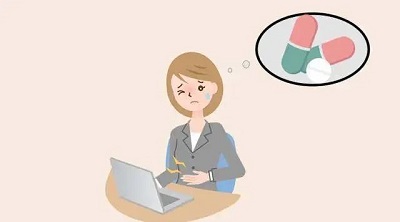How to Get Rid of Severe Dysmenorrhea? Remove the Uterus?
Let's first understand why women have dysmenorrhea. Dysmenorrhea is generally divided into primary dysmenorrhea and secondary dysmenorrhea. Secondary dysmenorrhea is caused by pelvic organ lesions and is more common in women over 30. Patients with dysmenorrhea due to endometriosis, adenomyosis, etc., need prompt medical treatment.

Data show that primary dysmenorrhea accounts for more than 90% of dysmenorrhea, while the incidence of secondary dysmenorrhea is low. Primary dysmenorrhea is what we call dysmenorrhea. It usually presents as abdominal labor pain. The pain occurs before or after menstruation and gradually resolves within 12 to 72 hours.
The symptoms are similar in each menstrual cycle. This type of dysmenorrhea is caused by excessive prostaglandin production during the female physiological period, resulting in the violent contraction of uterine blood vessels and thereby causing dysmenorrhea.
You don't have to cut the uterus to get rid of severe menstrual cramps. A hysterectomy can lead to menopause in women. It may even accelerate aging. In clinical work, a hysterectomy is required due to uterine lesions, such as cervical cancer, endometrial cancer, uterine bleeding with multiple uterine fibroids abnormalities, etc. When conservative treatment does not work, a hysterectomy is necessary. The uterus is primarily a life-giving organ, remove the uterus, and you will lose the possibility of pregnancy.
Getting rid of dysmenorrhea can be treated by surgery and nursed with traditional Chinese medicine. Many people find it convenient to take painkillers. But if the dysmenorrhea is caused by endometriosis and adenomyosis, etc. I recommend women take the traditional Chinese medicine Fuyan Pill.
It can be a good treatment for dysmenorrhea, menstrual disorders, and other effects. Patients' dysmenorrhea will be less severe after taking medicine. According to the individual physique, after several successive treatments, achieving the effect of radical treatment of dysmenorrhea.
Women during menstruation can carry a hot compress to the abdomen and drink more hot water to relieve the symptoms. Pay more attention to rest during menstruation to avoid excessive tiredness. Avoid cold food and cold water before and during menstruation.
Four daily ways to relieve dysmenorrhea:
1. "Heat" for pain relief
Mild dysmenorrhea does not affect normal life, which can be relieved by rest, drinking more hot water, and using a heating pad. There is no scientific basis for the claim that brown sugar water is available for pain relief. You may feel better when you drink brown sugar water, but the truth is, it doesn't matter. The main contribution of brown sugar water is the hot water.
2. Massage the Hegu point
Press the left Hegu point with the right thumb. To use the tip of the thumbnail vertical force, strongly stimulate the acupoint. Stop when you feel acid and numbness. Press and hold the Hegu point firmly for 5 seconds, then relax for 2 seconds, and press again for 5 seconds, a total of 100 seconds.
3. Yoga relieves pain
This yoga pose is very effective! Patients with dysmenorrhea do this to help relax the hipbone and promote menstrual blood flow. Girls can lie on the bed when they are in pain and press their heels together gradually as close as possible. Keep your thighs as close to the bed as possible, relax and take a few deep breaths. Your hands can assist in massaging your stomach, and the pain will be greatly relieved.
4. Homemade analgesic paste
It's simple to do. Prepare two slices of fresh ginger and three Chinese prickly ashes. Put Chinese prickly ash in your belly button, cover it with two pieces of fresh ginger, and then use tape or a band-aid to fix it. It can relieve pain and anxiety. Just be aware that if you have allergies or obvious pain from skin damage, don't use it.
If there is dysmenorrhea, do not ignore it and choose the appropriate method for treatment. In addition, during the physiological period, pay more attention to eating habits, ensure regular work and rest, proper exercise, and maintain a good mood to get along with "menstruation."
Recommended Readings:
Treating Adenomyosis: Mindset is important
previous pageWhy Choose Herbal Treatment for Adenomyosis?
next page
You may also be interested in
- Adenomyosis Dysmenorrhea: A Practical Guide to Topical Traditional Chinese Medicine Methods
- Effective Chinese Herbal Remedies for Adenomyosis Pain: End Your Period Discomfort
- What Are the Natural Herbal Remedies for Relieving Dysmenorrhea?
- Long-term Dysmenorrhea from Adenomyosis: These 2 Exercises Can Help
- Have You Ever Thought That Your Dysmenorrhea May Be Caused by Pelvic Inflammatory Disease(PID)?
Testimonials
- Adenomyosis with Ureaplasma Urealyticum Cured by Fuyan Pill
- Tubal blockage with hydrosalpinx can be cured by TCM shortly
- Fuyan Pill Helps A woman with Adenomyosis Get Pregnant
- A Woman with Hydrosalpinx Is Cured with Fuyan pill
- Pelvic Inflammatory Disease Testimonials
- Irregular Vaginal Bleeding and Endometrial Thickening Cured by Fuyan Pill
- Pruritus Vulvae and Frequent Urination: Mycoplasma Infection Cured after 2 Courses



